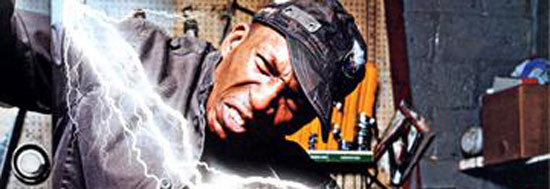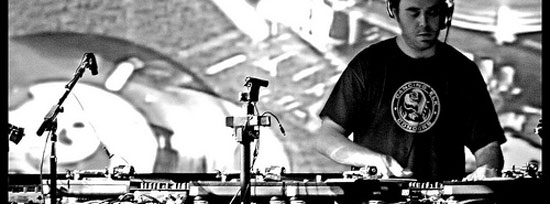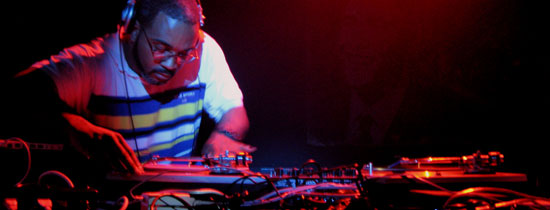Goldmine for Crate Diggers 2: Sample Laws
Posted by Justin Boland on Oct 14, 2009 | 0 Comments

The only hard part about running Audible Hype is this: I’m trying to out-do myself every time. After the first installation of our series on advice from hip hop production veterans, I wanted this to be like a textbook…that didn’t suck…about dealing with sample laws and the business side of making music. From Large Professor to Cut Chemist to The RZA himself, this is a collection of the best quotes I’ve found from reading thousands of pages about hip hop history and business. I eat books for reals…but the real winner is you. Enjoy.
DJ Shadow: Watch out for Jazz Cats

Source: Ripped, by Greg Kot
“I put out records with hundreds of uncleared samples to this day, but I try to clear the ones that I think are most likely to cause a problem. I live in fear of getting a call five minutes from now with some lawyer saying, ‘We want your house.’ I try to be conscious of who could be litigious, who could make a fuss over even a four-bar sample of a bass line. Which publishing companies are dangerous, which labels are watching. I’ve also learned the hard way that avant-garde jazz musicians listen. It doesn’t matter if they pressed two hundred copies of a record you sampled, they are out there and they will catch you.”
Domino

“Ultimately, legally, it doesn’t matter. You know, there’s all this talk about how you gotta use, like, less than three bars-that’s all bullshit. On the publishing side, maybe that’s true. But on the master side, you can sample any piece from a record, no matter what you get, they own that master. So anything you sample from their record, no matter what you do with it, legally, they own it”¦if they find out, then that’s what it is. They can pop you, no matter how small a piece you use.”Â
Hank Shocklee Explains Sample Laws in the Real World

When you were sampling from many different sources during the making of It Takes a Nation, were you at all worried about copyright clearance?
Shocklee: No. Nobody did. At the time, it wasn’t even an issue. The only time copyright was an issue was if you actually took the entire rhythm of a song, as in looping, which a lot of people are doing today. You’re going to take a track, loop the entire thing, and then that becomes the basic track for the song. They just paperclip a backbeat to it. But we were taking a horn hit here, a guitar riff there, we might take a little speech, a kicking snare from somewhere else. It was all bits and pieces.
Did you have to license the samples in It Takes a Nation of Millions before it was released?
Shocklee: No, it was cleared afterwards. A lot of stuff was cleared afterwards. Back in the day, things was different. The copyright laws didn’t really extend into sampling until the hip-hop artists started getting sued. As a matter of fact, copyright didn’t start catching up with us until Fear of a Black Planet. That’s when the copyrights and everything started becoming stricter because you had a lot of groups doing it and people were taking whole songs. It got so widespread that the record companies started policing the releases before they got out.
With its hundreds of samples, is it possible to make a record like It Takes a Nation of Millions today? Would it be possible to clear every sample?
Shocklee: It wouldn’t be impossible. It would just be very, very costly. The first thing that was starting to happen by the late 1980s was that the people were doing buyouts. You could have a buyout—meaning you could purchase the rights to sample a sound—for around $1,500. Then it started creeping up to $3,000, $3,500, $5,000, $7,500. Then they threw in this thing called rollover rates. If your rollover rate is every 100,000 units, then for every 100,000 units you sell, you have to pay an additional $7,500. A record that sells two million copies would kick that cost up twenty times. Now you’re looking at one song costing you more than half of what you would make on your album.
Cut Chemist

Source: Oh Word
Prince Paul has recently been speaking out a lot about how sampling laws have had a detrimental effect on hip hop production. How have sampling laws affected your production and how have you adapted to them?
Cut Chemist: They haven’t really. Yeah, it sucks, but it is copyrighted material. And I don’t think laws have changed, I just think they’re getting more enforced. There’s no law that says anything other than if you take a piece of music and somebody recognizes it ““ and that’s the key ““ then they got your ass. But recognize the shit I’m using, I’m calling you out. I use a lot of obscure stuff and I did clear a lot too, I cleared everything. But you can’t know everything. I’ve had people call up J5 and be like, “yeah man, we’re suing you because you used this,” and they’re naming something they don’t even own. There’s so many convoluted trails you can use to fight these laws. Say you recognize it, maybe you don’t even own it but you think you own it. Because I cleared the sample, maybe not through you but through the people who own it so break out, your beef is with homie so go get his money! Stuff like that. Somebody just needs to make a graph, you use such and such amount you owe this much money”¦
OW: Yeah, in terms of the length of the sample, etcetera”¦
CC: Yeah, you know, everybody wants to get paid and everybody should just be cool and realize it’s in their best interest to invite people to use their catalog. I know I’d want people to sample me, because it’s flattering and it’s gonna bring in money that it normally wouldn’t.
OW: Word, nowadays you got people buggin’ off a sampled snare or a single note”¦
CC: Oh, no. Warner Brothers isn’t even bugging out on me over drum beats and they’re the most conservative company in the world. I was like, “what about drum beats?” and they were like, “pshhh, we don’t care about drum beats,” and I was like, “cool.” So that was encouraging.
OW: So are you a vinyl-only purist when it comes to sampling or will you sample anything?
CC: I’ll sample anything. My whole vinyl-only kind of banner waving ways are dead. I think you have to embrace technology in order to grow as an artist and evolve. When I saw the CDJ I was sold. I was like, “cool, vinyl’s done,” and I was scratching on CDJ’s. Not solely, but I’m down to use it. And Serato. But you know, I sample off vinyl, I sample off a lot of cassettes, I lot of stuff I use are live recordings that maybe nobody else used. So I’ll use that and also sample live musicians.
Alchemist Looks Back at Cypress Hill Samples

Source: HipHopDX
“They’ve got so many joints that it’s crazy. Some of their joints go back to the times when the sample laws were not as strict. You were getting away with a lot more murder back in the Public Enemy days. It was crazy to try and break down some of those records with like 50 samples.
Sometimes it becomes an issue, but I just keep my fingers crossed. Sometimes it works as just a straight loop, and there are times where [the artist] will reach out and want full credit. You give the credit where it’s due. Sometimes you take a little piece, do surgery, and by cutting and splicing you get away with a little more. Those times I take more of a chance, because I took it and transformed it into something new.”
Large Professor: SAMPLING IS DOPE

Source: Junkmedia
JM: Now there are a lot of newer producers who talk about, brag about how they never use samples. But samples, to me, are what hip hop is about, and I personally have been educated by samples a lot.
Large Professor: Right. See, that’s so creative to me, because you’re taking something that is already saying something and you’re changing what it’s saying. Just flipping it and re-freshening it. It’s still amazing to me to sample. To just come up with different things out of. I don’t know. I can’t even really describe it, but that’s a good feeling, man. To flip something or chop something, it’s like “Wow. This is crazy. It was saying this before, but now I got it like.” It’s crazy.
Yeah. You redid it to where it’s something else. Then you put your rhymes over it and now you’ve made this other song have a whole new definition. And that goes back to the roots. That’s like reggae, everyone sounding over the same beats. It’s just…it’s just raw, man. I can’t even describe it.
Nicolay: Foreign Exchange Scientist

Source: Nicolay’s Blog. (The whole article is outstanding and worth reading.)
Sample Technique
Once I have decided what I am going to sample, I record it into the computer. Samples from a vinyl source go from my Numark DJ mixer into computer via the Digidesign 003, and samples from a CD source I usually “rip” directly using my wave-editor, which is SoundForge. SoundForge allows me to make extremely precise cuts, and before I load the sample up in my sequencer, I normally will “prepare” it by cutting it up into several smaller pieces. If the sample includes a drum or other rhythm track, it should be fairly easy to cut it up into separate bars or even smaller units of 4th or 8th notes. It is a bit of a tedious process, but doing this will pay significant dividend later on in the programming process, as you have more control over the timing of the sample as well as over the order of all of the different smaller pieces.
Looping vs. chopping
The word “looping” already says it all: You take a really great sounding piece of music, preferably the most climactic moment of a song, and you loop it. A lot of classic hip-hop productions are based on loops of some sort, whether it’s a full sample or a drum-loop. You can use a loop “as is”, you can pitch it down or up, or you can EQ, filter or otherwise process it, but there’s a limit to what you can do. More importantly, depending on the notariety of the sample, a “loop” can be easy to recognize. To prevent that, you can also “chop” the loop up into smaller pieces, as mentioned above, and re-order those pieces so that they form a completely new melody or phrase. There have been and continue to be many fantastic sample choppers around, but the O.G. has got to be DJ Premier, whose discography will provide hour upon hour of study material. The best example of his genius in my opinion is his beat for ‘You Know My Steez’ by Gangstarr. Search for the original sample, and you’ll know exactly what I mean. If there is such a thing as a “textbook chop”, this is the one!
RZA: The Abbott Talks Numbers

Source: Spin Magazine
“In the old days, samples were $2,500 or $1,500,” says RZA. “I paid $2,000 for a Gladys Knight sample for ‘Can It Be All So Simple’ off Enter the Wu-Tang (36 Chambers). That was a big intro, and the hook was repetitious. Something like that nowadays would cost $10,000.” The problem, RZA says, is that high prices are discouraging producers like him from using samples, which in turn impacts all parties’ ability to make money.
“For Gladys Knight, even though [that sample] only cost $2,000, that was an advance,” he says. “Enter the Wu-Tang went on to sell millions of copies. She probably made about $50,000 [from publishing]. The master owner probably made a good amount of money, too.”
Right now, without sampling in hip-hop,” RZA says, “it’s really a soggy-ass form of music. The art form of hip-hop-the sound that attracted us to it-is diminishing. It’s becoming just another form of pop music.
De La Soul vs. The Turtles

Source: HipHop.com
Dave: One of the things that I think will always tie in with the name De La Soul is sampling and sample clearance issues and court dates and so on and so forth. I guess we obviously had a part in making this great business called sample clearance, where there’s people making money just off clearing samples, not even being the people who own the publishing. Clearance companies are definitely booming nowadays. But it was one of those things I think needed to happen, and fortunately we were a part of making it happen. Rightfully, we were definitely wanting to be able to acknowledge the fact that we sampled some people, and they rightfully should know that we used it, and we’d get the clearance for it. And if there has to be a payment structure, let’s make it happen. That’s exactly what we did for 3 Feet High and Rising. We went through the process of making sure we had all the information. Unfortunately, the record was going so much in demand at the time that Tommy Boy didn’t take the opportunity to clear all the samples prior to the record’s release: they just released it anyway, and then we found ourselves in a lot of trouble. But it’s important to us that we clear samples, from day one to today. We definitely want people to be acknowledged for what they’ve done, and paid for what they’ve done.
Paul: Yeah, I remember there was a law suit going on [with The Turtles - whose version of You Showed Me was sampled for Transmitting Live from Mars]. I remember the lawyer sending me questions: ‘When y’all did this, what did y’all do?’ And blah bah blah. But they more or less sued the label. You know what happened, and why I never really paid much attention? I never made money making a record, so them suing Tommy Boy wasn’t like it was hitting my pockets, because I’d never seen any money. I was like, ‘So? Whatever.’ It wasn’t like I was gonna come home and find my furniture was gone - I didn’t have anything to begin with! You know? I never seen a royalty cheque. But then, even after the law suit I got a nice royalty cheque, which I thought was nice for me, because I made no money. But now I think about it, man, if there hadn’t have been a law suit maybe I’d have made more money! But that was Tommy Boy’s fault. They decided not to clear the sample. We gave them every lick, every sample that we used, and it was their decision. I remember clearly them saying, ‘Oh, this is obscure, don’t worry about this.’ Hall & Oates they had to clear. ‘This? We don’t have to worry about this.’ We wrote down everything, so the label could never say ‘You guys! How could you do this!’ It was never that. They knew it was their fault.
Our court case, yeah, it was known because it was the first. But if you wanna blame somebody, put the blame on Biz! I tell him that all the time. He was the one who blew it totally out of the box. It’s different when somebody says, ‘Hey, don’t use my record’, and you use it. You know what I’m saying? That’s wrong! And very bold! You know? Nobody knew - there were no guidelines for sampling - then he just blew it out of proportion.
